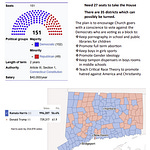
Proper 8
1 Kings 19:15-21; Galatians 5:1, 13-25; Luke 9:51-62
You can also subscribe to this podcast on Apple, Spotify, or YouTube.
I.
The phrase “regime change” dominated headlines this past week.
Last Sunday, we stood on the brink of another war in the mideast. We’ve walked back from the brink, but many are still calling for regime change in Iran. Meanwhile, change is hitting home.
Here in Connecticut, an appalling video released last week by Project Veritas shows a regime change underway, undermining parental rule and rights.
The video exposed how easy it is for underage children to access gender-affirming support networks.
For me, the video’s most upsetting revelation is a Connecticut pastor’s involvement.
In the video, a transgender life coach tells an undercover reporter, posing as an underage girl, “Between me and you, I can’t know if the parents don’t know… wink, nod. We hand out free [redacted], meant for 18+, but we slip one to Reverend [redacted] and see what he does. You know what I’m saying?” You can watch the rest yourself on YouTube.
I’ll come back to this unfortunate pastor and what I think should be done, but first, understand what’s happening.
This isn’t the free exercise of religion.
This is subversion of religion by a hostile actor, someone opposed to the standing order of churches and towns in Connecticut.
The old, Bible-based ways—God’s truth as it was preached in our churches and lived in our towns—is under attack, and we must fight back.
The question I want to answer in this sermon is: How do we restore that ancient church and civic order?
I am not talking about restoring an established church or taxing the townsfolk to pay my salary.
I am asking: How do we put things right with a regime change of our own? We’ve been losing this fight for over a century, with churches and towns mostly overtaken. We’ve lived through a regime change that many of us never asked for.
II.
Now, let’s see how God’s regime change played out in old Israel in today’s reading from 1 Kings.
Elijah commissions Elisha to continue his holy war against the false god, Baal, and the Israelite kings who had been serving and worshipping Baal instead of Jehovah.
Verses 15-16 describe the coming regime change, commanded by God, and given to Elijah to put into effect.
“And the Lord said to him, ‘Go, return on your way to the wilderness of Damascus; and when you arrive, you shall anoint Haz′ael to be king over Syria; and Jehu the son of Nimshi you shall anoint to be king over Israel; and Eli′sha the son of Shaphat of A′bel-meho′lah you shall anoint to be prophet in your place.’”
These verses describe regime change both in the civil order and in the church. If you need any biblical evidence that kings and rulers, prophets and priests are chosen by God, here is your proof-text.
Verses 20-21 recount the cost of this regime change to Elisha personally.
“And he left the oxen, and ran after Eli′jah, and said, ‘Let me kiss my father and my mother, and then I will follow you.’ And he said to him, ‘Go back again; for what have I done to you?’ And he returned from following him, and took the yoke of oxen, and slew them, and boiled their flesh with the yokes of the oxen, and gave it to the people, and they ate. Then he arose and went after Eli′jah, and ministered to him.”
The text shows Elisha’s wealth: he sacrifices twelve yokes, or twenty-four oxen.
He does this to show that he is ready to sacrifice his old life and leave it behind.
He’s making a vow, and vows use symbols. Just as wedding rings symbolize unity and an unbreakable bond, so this sacrifice of oxen acknowledges the cost of waging a spiritual and material war to bring regime change to ancient Israel.
Elisha knows what he is getting himself into. In the previous chapter, 1 Kings 18:40, Elijah killed the prophets of Baal. This is a holy war he’s been called to fight, with real killing and real dying.
Elisha knows becoming a prophet requires sacrifice. He must give up his former life.
Elisha knows that he is called to fight a spiritual war against the false god, Baal.
But Elisha also knows it means he must fight a physical war as well. He needs a war chest to do that. Like nations at war, Elisha spends his wealth for this fight.
That’s what Elisha’s sacrifice of the twenty-four oxen means. He shows he’s ready to cover the cost—both spiritually and materially—of this war himself.
Elijah throws his mantle over Elisha and recruits him to the Lord’s side in this revolution.
Elijah has been waging a war against idol-worship in Israel and the licentiousness it breeds.
There are risks involved when attempting to change a corrupt regime.
If we are going to throw off a corrupt yoke, if we are going to restore something like the ancient standing order of Connecticut, then we must be prepared to cover the cost.
But we’re not going to war, at least not that kind of war. God is not asking us to sacrifice our wealth to build an army.
Elisha was called to fight. 1 Kings 19:17 says, “And him who escapes from the sword of Haz′ael shall Jehu slay; and him who escapes from the sword of Jehu shall Eli′sha slay.”
But Jesus makes it clear that He doesn’t want His followers to wield the sword to change the regime.
III.
Elisha fought a holy war, but Jesus shows us a different way in Luke’s gospel. The fight we’re asked to join is a spiritual fight.
Jesus is traveling to Jerusalem and taking a shortcut through Samaria. There is hostility between Jews and Samaritans.
About a century before, the Jews destroyed the Samaritan place of worship. So, when the Samaritan townsfolk realize that Jesus is on His way to Jerusalem, presumably to worship in the Jewish temple there, they refuse their hospitality.
This is the context for the otherwise odd question the disciples ask Jesus in Luke 9:54, “Lord, do you want us to bid fire come down from heaven and consume them?”
Luke 9:55 tells us that Jesus rebukes them and verse 56 tells us “they went on to another village.”
Here’s where you King James Bible readers have an advantage. In the King James, as well as in the footnote in the Revised Standard Version, there is an extended version of verse 56 that reads, “You do not know what manner of spirit you are of; for the Son of man came not to destroy men’s lives but to save them.”
I think that missing part of the verse is important for two reasons. First, it explains why Jesus rebukes His disciples. Second, it characterizes the nature of the fight. This is a spiritual fight, not a physical one—and it’s the fight we’re called to today.
Now, don’t misunderstand this. Just because a fight is spiritual does not mean it will have no physical effects.
Last week, we read in Luke 8 about the Gerasene Demoniac, a man possessed by a legion of demons. We also read that he went about naked, lived in the tombs, and often had to be restrained by chains, because the demons seized him.
What does that tell you?
It tells us two things: The man’s very real, physical ailments were caused by his spiritual condition. The spiritual realm can and does act on the material realm. The body is a mirror to the soul.
It also tells us that the battle for regime change must be fought with spiritual weapons. This is our fight in Connecticut—spiritual, not physical—like the subversion of our churches.
Jesus does not authorize the use of any other kind of weapon: “for the Son of man came not to destroy men’s lives but to save them.”
This is not a cope. The weapons of the Spirit have greater physical effect, not less.
Destroy one Samaritan town with fire from heaven and what have you done? Destroyed one Samaritan town and the lives of the men who dwell there.
Use spiritual weapons against the Samaritans and what have you done? You’ve converted them.
IV.
Jesus didn’t destroy the Samaritans—He had a better plan, as we see in Acts 8. Luke holds the Samaritans’ story for Acts 8. That’s because Jesus has yet to unleash the most potent spiritual weapon of all: the cross.
Luke 9:51 tells us, “When the days drew near for [Jesus] to be received up, he set his face to go to Jerusalem.” This is why the Samaritan villagers reject Him. It’s also why they will come to accept Him later.
In Acts 8:3-8 we read, “But Saul was ravaging the church, and entering house after house, he dragged off men and women and committed them to prison.”
Let me stop to point out what Saul, later Paul, is doing.
He is using a physical weapon against the Church. He is trying to destroy the Church with brute force.
But the Church has a spiritual weapon at her disposal, the gospel of Jesus Christ.
Paul’s persecution scatters the Church, which causes the Church to grow.
Luke continues at verse 4: “Now those who were scattered went about preaching the word. Philip went down to a city of Samar′ia…”
Wait—Samaria. You know them from Luke—the villagers who rejected Jesus.
The Samaritans are the people that the disciples wanted to destroy with heavenly fire—because they refused hospitality to Jesus and His disciples—but Jesus said, “You do not know what manner of spirit you are of; for the Son of man came not to destroy men’s lives but to save them.”
Let’s continue:
“Philip went down to a city of Samar′ia and proclaimed to them the Christ. And the multitudes with one accord gave heed to what was said by Philip, when they heard him and saw the signs which he did. For unclean spirits came out of many who were possessed, crying with a loud voice; and many who were paralyzed or lame were healed. So there was much joy in that city.”
There was “much joy in that city.”
This is the regime change we need—not destruction, but salvation. I want to see much joy in Connecticut. I don’t want to see it destroyed. I don’t want to call down fire, and I don’t want the pastor from that video destroyed.
I want to see him “sitting at the feet of Jesus, clothed and in his right mind” just like the Gerasene Demoniac in Luke 8:35.
V.
So how do we bring God’s regime change today? We, the Church, are here, right now, to fight for Christ with His spiritual weapons.
Yet we see in today’s gospel that one by one, would-be recruits to this fight find excuses not to join. I think this pastor might be like one of those in Luke 9:57-62—dodging the cost of true discipleship.
In verse 57 a would-be disciple says to Jesus:
“I will follow you wherever you go.” This is the kind of man who sees the ordained ministry as a comfortable sinecure, one that requires little work and not much sacrifice.
To this man Jesus says, “Foxes have holes, and birds of the air have nests; but the Son of man has nowhere to lay his head.” In other words, “No parsonage for you.”
In verse 59, another would-be disciple says:
“Lord, let me first go and bury my father.” To which Jesus replies, “Leave the dead to bury their own dead; but as for you, go and proclaim the kingdom of God.”
Old habits, especially sinful ones, die hard. A lack of courage is a spiritual condition, but courage is a spiritual weapon God gives us to fight for His kingdom.
In verse 61 another would-be disciple says:
“I will follow you, Lord; but let me first say farewell to those at my home.” To which Jesus replies, “No one who puts his hand to the plow and looks back is fit for the kingdom of God.”
This example could convict many would-be ministers, including myself at an earlier point in my career.
We discern the call to preach God’s kingdom, we answer it, but in the pulpit, our words fall short.
I think this may describe the unfortunate pastor in the Project Veritas video.
The word of God is a powerful spiritual weapon. Preachers are called to wield it.
On one of the Sundays leading up to Pentecost, we read from John 14:26, “But the Counselor, the Holy Spirit, whom the Father will send in my name, he will teach you all things, and bring to your remembrance all that I have said to you.”
We are now in the season after Pentecost. We live with the benefit of the Counselor’s counsel. One of those benefits of the Spirit’s counsel is the accumulated body of Christian law.
In our own tradition, that is the Anglo-Saxon Common Law, the bedrock upon which the “Constitution State’s” constitution still stands to this day. Here’s where it hits home for Connecticut.
Let me make a final application of today’s readings that may startle you. Psalm 19:7 says, “The law of the Lord is perfect, converting the soul: the testimony of the Lord is sure, making wise the simple.”
From foreign wars to our own churches, God’s law restores order. The law-word of God is a spiritual weapon that Christians habitually underutilize.
We’re quick to pray, eager to study the Bible, evangelize, feed the poor, and clothe the naked. I am going to go out on a limb here and say that we’re even more willing to tithe than we are to apply God’s law to effect a regime change.
Yet it is the tool that God gave us to wield to exercise the dominion over the earth He gave us (Genesis 1:26-30).
I believe there is a legal, constitutional remedy for these unfortunate churches. I believe that Christians are called to wield this spiritual weapon, not to destroy them but to convert them: “The law of the Lord is perfect, converting the soul.”
Our forefathers came to these shores to practice their religion freely. As I preached last week, they knew their right to worship was grounded in their duty to worship. It was not a paper right or privilege granted to them by the state. (See: The Duty of All Men.)
They also knew that the right to worship, especially when it is divorced from the duty to worship, can result in worship that is corrupt.
Hence our forefathers, wisely guided by the promised Counselor, the Holy Spirit, wrote this clause into the 1818 Constitution, which was preserved in our current constitution from 1965, Article First, Section 3:
“The exercise and enjoyment of religious profession and worship, without discrimination, shall forever be free to all persons in the state; provided, that the right hereby declared and established, shall not be so construed as to excuse acts of licentiousness…” (emphasis added).
Licentiousness is defined as “lacking legal or moral restraints,” especially as “disregarding sexual restraints.” It also means “marked by disregard for strict rules of correctness.”
Any pastor helping minors break the law is surely engaged in licentiousness. Any church that knowingly supports such a pastor aids and abets him. Both should be challenged under the state constitution. The free exercise of religion clause does not excuse what they are doing.
If this clause wasn’t written for such a time as this, it’d be better if it hadn’t been written at all. We could say we have no obligation to act, no spiritual weapon to wield.
But it was written—by wise and Christian men—and it now imposes a duty on the citizens—especially the Christian citizens—of this state to apply the law.
I have preached before that we are kings and priests. We do not rule by calling down fire from heaven. We rule by applying the law of the Lord.
There will be a cost to the disciples who enlist in this fight. This is why Jesus had trouble gaining new recruits. But if we refuse to put our hand to the plow, we have to ask ourselves: do we really love God and our neighbor?
Paul writes in today’s reading from Galatians 5:14, “For the whole law is fulfilled in one word, ‘You shall love your neighbor as yourself.’”
We must apply the law of love—not, as some Christians mistakenly think, out of a duty to be nice or to “go along to get along,” but to proclaim the kingdom of God without excusing blatant acts of licentiousness.
That is how we will change the regime and restore a godly order to the towns and churches of Connecticut.
I call upon the attorney general of this state, William Tong, to investigate the church in this Project Veritas video and any other churches like it.
I call upon United States Attorney General Pam Bondi and the Religious Liberty Task Force to investigate.
When licentious acts masquerade as religious observance and so-called churches give cover for these acts, they destroy the free exercise of true religion.
There is no right to the free exercise of sin, and when sin and licentiousness are promoted by the Church, the state is constitutionally bound to act.
It is time for Connecticut’s churches to defend their ancient rights and petition the state to end this gross misrepresentation of faith in our state.
Preached on June 29, 2025, at the First Congregational Church, Woodbury, Connecticut.
For more information see: “Case Study: Leveraging Article First, Section 3 of the Connecticut State Constitution to Address Licentiousness in Progressive Churches.”
Discussion Questions
The sermon describes Elisha’s sacrifice of his oxen as a costly commitment to God’s call for regime change in Israel. What are some “costs” (e.g., time, comfort, reputation) we might face today when standing for biblical truth in our churches and communities? How can we prepare to “cover the cost” like Elisha?
Jesus rebuked His disciples for wanting to call down fire on the Samaritans, emphasizing a spiritual fight over a physical one. How can we apply this principle when confronting issues like the pastor’s actions in the Project Veritas video, ensuring we fight with faith and love rather than anger or judgment?
The sermon highlights the Connecticut Constitution’s clause against “acts of licentiousness” as a spiritual weapon for restoring godly order. How can we, as Christians, practically wield this “law of the Lord” (Psalm 19:7) in our community to address moral and cultural challenges without compromising love for our neighbors?
The Application compares the Yale-trained pastor from the Project Veritas video to the would-be disciples in Luke 9:57-62, who made excuses to avoid true discipleship. Have you ever struggled with excuses or fears that keep you from fully following Christ’s call to proclaim His kingdom? How can we overcome these through the Holy Spirit’s counsel?
Paul’s words in Galatians 5:14, “You shall love your neighbor as yourself,” are presented as the fulfillment of the law in the sermon’s call to restore Connecticut’s godly order. How can we balance applying God’s law to confront “subversion” (like the Yale-trained pastor’s actions) with showing love to those who oppose biblical values?











